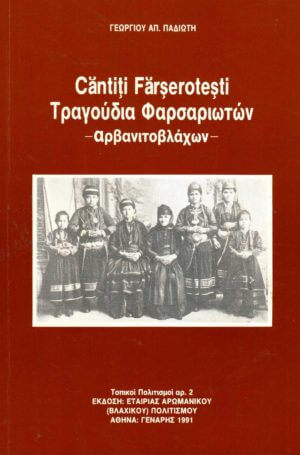Cultural Forum: The Women of Nizhopoli
Our community represents a golden opportunity for oral history. Not only do we preserve some of the language and customs that have been lost in the old country over the last 75-100 years, but we also have recorded the history of the immigrant experience in America. Here is just one example, a song that used to be sung by women from Nizhopoli and Magarova who ended up working together in a factory in the American Northeast:
|
Di cu noaptea-noaptea |
It is still night-time |
|
Fabritsli zghilescu |
When the factory sirens blow |
|
Milioani di oamini |
And millions of people |
|
La lukru nkisescu |
Off to work do go |
|
La shasili satia |
At six o’clock P.M. |
|
Lukrulu s’alasa |
When work is done |
|
S’toarna lukritorli a casa. |
The laborers return home, |
|
A casa di s’ntreaba |
At home they ask |
|
Unu di alantu, |
Each one of the other, |
|
“Alasatsi-mi, sotsi, |
“Don’t bother me, friends |
|
Nu mi cartitsi. |
Leave me alone, |
|
Amu yinati mari |
I am very angry |
|
Pri a melli parintsi. |
With my parents back home. |
|
Cati ori lliau carti |
Every time I get a letter |
|
Di la parintsi |
From my parents |
|
Nu s’fatsi |
They never fail |
|
S’nu ni cafta paradzi.” |
To ask me for money.” |
There are hundreds (if not thousands) of such songs waiting to be recorded before the last members of that generation pass on. What we need is a committed effort to record and catalogue this oral history. Beverlee Fatse Dacey was the pioneer in doing this for our community, and Dr. Tom Winnifrith will be coming over from England next year to conduct similar research. But there is much more to be done. Fortunately, there are many types of grants available in the United States for projects of this kind, but qualified persons must apply for them and then see the projects through. Anyone interested in coordinating such a project should contact the Society Farsarotul for initial support and guidance.
_______________________________________________________________________________
“Tradition means giving votes to the most obscure of all classes, our ancestors. It is the democracy of the dead. Tradition refuses to submit to the small and arrogant oligarchy of those who merely happen to be walking about.”
—G.K. Chesterton



Responses